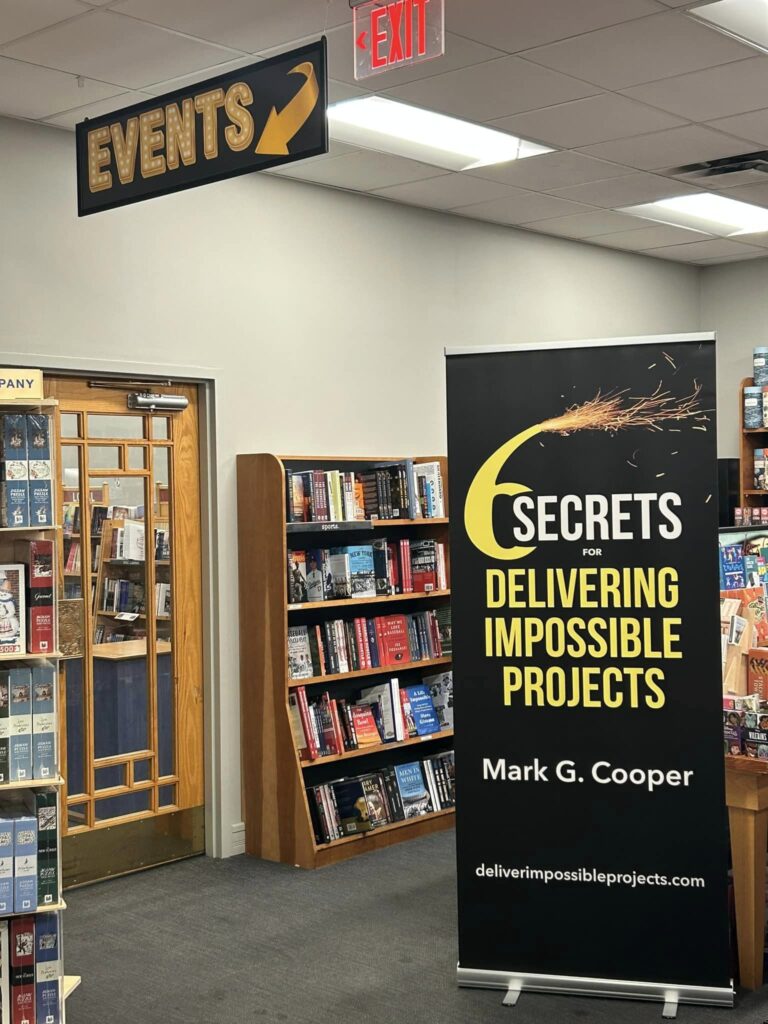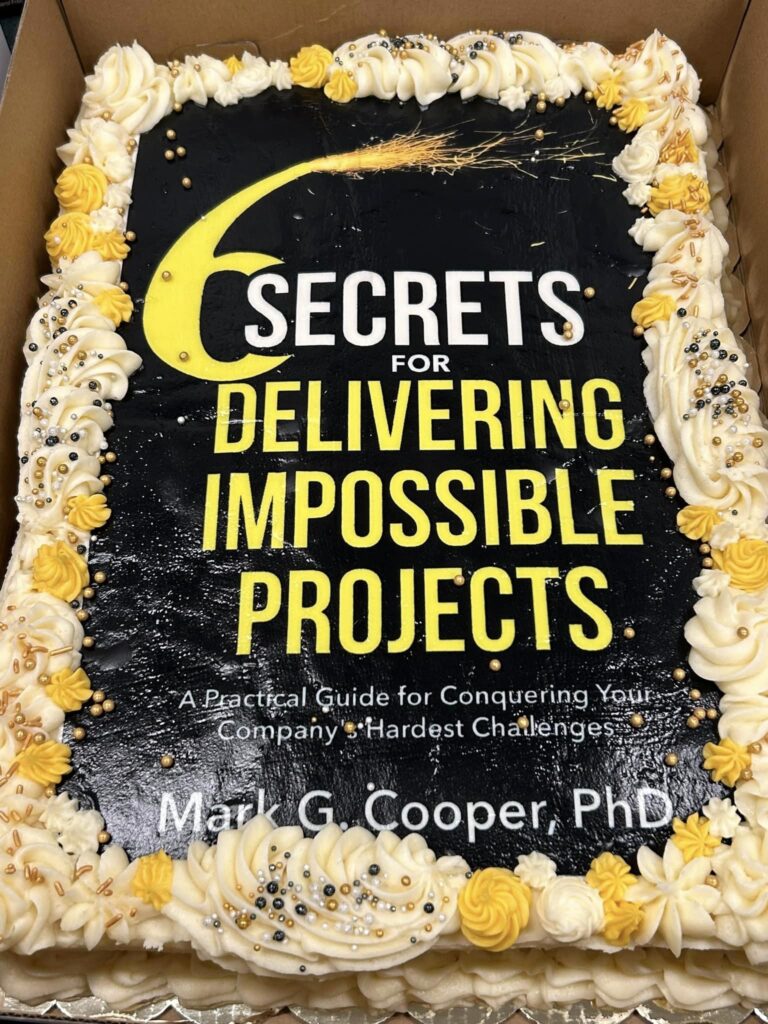Do you gravitate toward the most difficult problems? Do you seek out the most interesting and impactful challenges? If so, then 6 Secrets for Delivering Impossible Projects will give you the tools to successfully deliver your own Impossible Projects
On Tuesday, October 29th, family, friends, and colleagues gathered at the Novel bookstore in Memphis for the launch of my new book: 6 Secrets for Delivering Impossible Projects. I shared some of the background about writing the book, read a few of my favorite stories, and answered questions about Impossible Projects. We ate cake and caught up with each other. I am grateful to those who contributed to the book and who hosted the event. And especially to everyone who attended. It was a truly exceptional evening.



Following are a few excerpts from my remarks:
The book’s origin goes back to 2012. A friend and colleague at Christian Brothers University asked if I would prepare a guest lecture for one of his classes. I had done several before, so I eagerly agreed. We talked about topics and it turned out that he wanted something other than the usual introduction to data warehousing or information management. Instead, he asked me to share my thoughts about the things that I learned in college that had been helpful in my corporate jobs. Intrigued, I put together a lecture entitled The Real Curriculum. Over the years I’ve given that presentation several times at the three local universities.
Then, the following year this happened:
The auditorium was beginning to fill when I arrived. Alongside me were the two people with whom I had worked most closely for the past eighteen months. We sat together toward the front. For the next several minutes, a steady stream of people entered and took their seats. Groups assembled and joined via video conference at other locations as well.
That day we all gathered to celebrate the delivery of the largest single-load project in the company’s history. It implemented fundamental changes to customer capabilities, business processes, operational procedures, and data pathways.
The project touched more than one hundred different applications, and I had led a team of more than forty architects and subject matter experts. I turned and looked at the crowd behind me. It was amazing and gratifying and humbling to see everyone in the auditorium, and to stand atop that pyramid.
Two years earlier, the smart money said that there was no way that the project could be accomplished, but the team came through. Doubt lingered even as late as a few weeks before the target date, but the soft launch went so well that the product was released to the broader market several months earlier than planned. We had delivered an Impossible Project.
They said it couldn’t be done. They said it was too complicated. They said there were too many moving parts. They said it was impossible. One of the most satisfying career accomplishments is successfully delivering an Impossible Project.
It was at about that time that I wanted to develop a follow-up to The Real Curriculum. I’ve always been a huge Tom Peters fan, and I keep one of his quotes in the forefront of my mind: “You are your projects.” I started thinking about my projects.
Most of the time we do Ordinary Projects. Some are harder than others. Some are more or less interesting. Some are more or less impactful. But most are necessary. They keep the company running. They keep product moving and revenue flowing. They facilitate continuous incremental improvement.
Unfortunately, we will occasionally end up on a Death March. As the name suggests they are uninspiring, unnecessarily difficult, sometimes unnecessary altogether, and always draining. Some of the project objectives might be delivered, but a trail of wreckage is left behind.
But once in a while, a project comes along that is palpably different. You will recognize it when you see it. A project that has the potential to drive substantive change or deliver a breakthrough innovation. You know that it will be challenging. Maybe it’s been tried unsuccessfully before. Maybe people are lined up down the hall ready to tell you that it can’t be done. But if there’s a customer, clarity of vision, and management support, you can deliver it. It’s not just an Ordinary Project. It’s an Impossible Project.
I love Impossible Projects.
I would actively pursue these projects, and I’ve had the opportunity to work on several during my career. In some cases, the project was overwhelmingly large and complex. In others, the prerequisite technology didn’t exist. Once I was laughed at for suggesting what I thought was a reasonable solution. In each instance, and against the prevailing wisdom, we successfully delivered.
OK, maybe not guffaws and belly-laughs. But had the meeting been closed captioned, the subtitle might have read “[scoffs].” I think there may have been some chuckles, too. And we succeeded. Other projects had similar challenges. Even back to my dissertation research. I wondered if they had anything in common. It turns out that they did.
Those commonalities became a first set of “secrets.” I had barely scratched the surface, but as so often happens the project got moved to the back burner.
Then to the counter.
Then to the deep freeze.
Fast forward a decade to the beginning of this year. I had recently launched my own consultancy and was considering the set of services that I could offer. I love doing keynote addresses and presentations, so I included The Real Curriculum on my website. I also dusted off the 6 Secrets idea.
At about that time, I spoke with several consultant friends about how to get started in the business. During the conversations these presentations came up. The two friends in the field that I hold in the highest regard both suggested that I develop 6 Secrets into a book. As I say in the acknowledgments, “sometimes it just takes a little nudge.”
I started writing in February. The key to writing, at least for me, is to do some every day. I got into a cadence and rhythm, and after a few months an initial draft of the text was finished. The earlier secrets evolved, matured, and gained substantially more breadth and depth. The next few months were spent refining the text and sending it to others to proofread.
One comment from all of my editors was that the information in the book would be useful in many different fields. I had approached the topic from the perspective of a senior technical person or enterprise architect, but the secrets are really useful for anyone in any field who wants to deliver large, complex projects.
This book will be most useful for those whom psychologists describe as having a clutch mentality. The basketball player who calls for the ball to make the last-second shot. The singer who gives her best performances in the limelight at center stage. The paramedic who is always first on the scene caring for the most seriously injured. The executive whose calm decisiveness secures the deal despite challenging negotiations.
And the leader who seeks out and delivers Impossible Projects.
Sometimes the scenarios are more mundane, but they’re no less indicative. Maybe you look forward to completing the New York Times crossword puzzle each Sunday. Maybe you’re not a very good artist but still prefer the Difficult category in Pictionary. Maybe you start with Potpourri for $1000 please, Alex. Maybe you just like solving hard problems.
If any of these scenarios sound familiar, then this book is for you.
My goal is to help you to identify extraordinary projects, Impossible Projects, so that you can pursue them, lead them, and succeed with them. It is practical advice born of experience.
I am very excited that the book is finally available. You can order signed copies online at Novel Memphis (especially if you want to support a local business that supports local authors). It is also available at Amazon and Barnes & Noble.
My greatest hope is that you will like the book and find it useful. If you do, please leave a positive review wherever books are reviewed, including social cataloging sites like Goodreads. Good reviews are how others will find out about the book. Of course, if you have less-positive comments, please let me know privately.
Ultimately, the goal is to see the delivery of an increasing number of interesting and impactful projects. Seems like that would be a good thing for most every company.
Excerpts from 6 Secrets for Delivering Impossible Projects Copyright © 2024, Mark Gary Cooper; reprinted with permission.


